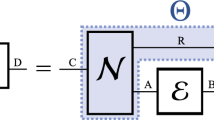Researchers Bartosz Regula and Ludovico Lami have investigated the complexities of quantum entanglement. Their findings, published recently in the journal Nature Communications, reveal the possibility of reversing quantum entanglement, essentially reversing the "arrow of time" in the quantum realm.
The concept of entropy, a measure of disorder or randomness, plays a crucial role in understanding quantum systems. Although entropy is well defined for classical systems, its application to quantum entanglement has been the subject of debate.
Regula and Lami's research introduces a new approach to defining quantum entropy, using probabilities instead of deterministic equations, writes Popular Mechanics.


In their mathematical model, probabilities serve as a tool for exploring the reversibility of quantum entanglement. Unlike traditional equations, which are based on precise mathematical certainties, probabilities offer a more nuanced understanding of quantum phenomena.
This approach allows scientists to investigate the intricacies of quantum entanglement and its potential for reversibility.
Just as real-life researchers evaluate probabilities to narrow down possibilities, scientists use probabilities to navigate the complexities of quantum mechanics.
The implications of the new study's findings go beyond theoretical physics, with potential applications in quantum computing and beyond. Scientists can open up new possibilities for harnessing quantum phenomena in practical technologies.






